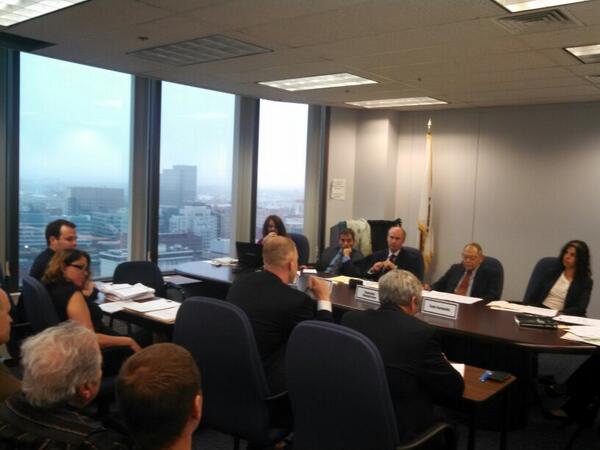From Here to Inhabitancy, Allen and Lesser Do Battle…
This post has been re-dated to bump it to top of page. Its original timestamp was 6/16/14 1:08AM

State Ballot Law Commission hearing last Friday. Eric Lesser, the respondent, seated at far left facing commissioners. Tim Allen, the objector is seated at far right (WMassP&I)
BOSTON—In a five-way race, it was about as close as to mano-a-mano as the Democratic primary for the 1st Hampden & Hampshire Senate district would get before September.
After months of anticipation and media attention, the State Ballot Law Commission heard Springfield City Councilor Timothy Allen’s objection to the candidacy of Eric Lesser, a former White House aide. Perhaps encapsulating the hearing’s lopsided nature, Allen and his attorney Christopher McDonald introduced little evidence besides tax returns and leases subpoenaed from the Longmeadow Democrat. Lesser and his attorney, Cheryl Cronin, countered with a hefty stack of tax, financial and campaign documents.
Both candidates were called as witnesses by the other’s attorney, but Lesser also called his accountant.
Allen challenged Lesser’s eligibility for the office due to Lesser’s time in Washington, while an assistant to two of President Barack Obama’s top aides from 2009 to 2011. The Massachusetts constitution says senate candidates must “inhabit” the state for five years prior to election, but the courts and Ballot Commission have set a high burden of proof for an objection to succeed. To remove a candidate, an objector must show the candidate manifested the intent to establish inhabitancy outside the commonwealth with no intent to return. Temporary absences due to employment like government service, alone, are insufficient.
The Commission Chair noted the standing room-only attendance. Most were ostensibly Lesser supporters. During a post-hearing press scrum, Lesser, flanked by wife Alison Silber and parents Joan and Martin Lesser, was joined by almost everyone who sat through the two hour hearing.
There's a certain surreality to this hearing. It's part long-form @ericlesser campaign stump part legal proceeding. #mapoli #1sthampsen
— Matt Szafranski (@MSzafranski413) June 13, 2014
On the 17th floor of a state building, overlooking a rolling fog engulf and reveal the Longfellow Bridge and Boston cityscape, the confluence of Lesser campaign bio and a legal proceeding felt oddly ethereal.
Throughout the late morning hearing, Lesser, on leave from Harvard Law, was cool and calm, often defaulting to his trademark content, but restrained smile. He comfortably delivered thoughtful answers on the witness stand. Allen, too, appeared at ease until called as a witness. Under heavy questioning from Cronin, he struggled to explain his grounds for the objection. He seemed unclear and sometimes cagey, in stark contrast to his reliably prepared and direct demeanor at Council meetings.
McDonald suggested in his opening statement that the Romney and Stebbins decision (yes, that Mitt Romney and Springfield’s former councilor turned Gaming Commissioner Bruce Stebbins) were distinguishable from the Lesser’s situation. Cronin, by contrast, argued those decisions were precisely on point and that the entire hearing was a political charade.

Lesser on the stand (WMassP&I)
Much of both Cronin and McDonald’s questioning of Lesser focused on his biography, starting with Lesser’s 2003 and 2007 graduations from Longmeadow High School and Harvard respectively. He took a job with then-Senator Obama’s presidential campaign, starting in advance and moving on to his well-known role as “bag boy.” After Obama defeated John McCain in November 2008, Lesser was offered a position as an assistant to David Axelrod, Obama’s top political aide.
The minutiae of his time thereafter was even more granular touching on: the length of his leases; who his roommates were and where they lived; when he met Silber, his wife; a list of personal, religious and familial visits to Greater Springfield; DC income tax law; his bank accounts; his voting record; what personal affects Lesser left in Longmeadow; Lesser’s membership at Sinai Temple along with a brief, but humorous contemplation of his religiosity; and why he retained his Massachusetts driver’s license.
As the discussion of Lesser’s timeline advanced, Allen’s case appeared to center on Lesser’s plans to return to the commonwealth. This included meticulous breakdowns of otherwise standard DC apartment lease agreements, all for less than a year, and his understanding about how long he would be at the White House. McDonald also asked whether Lesser owned property in DC or Massachusetts (He does not.). There is no property requirement to run for state Senate.
Though never stated explicitly McDonald seemingly tried to undermine Lesser’s “inhabitancy” (a legally distinct term from residency, but interchangeable with domicile), by suggesting that his plans to live in the state were a “floating intention.” Had Lesser been seeking out of state jobs, McDonald could argue, if not prove, Lesser had no firm intent to move home until Candaras retired.

Lesser supporters made up much of the public in attendance. Those with their backs to the window were sitting on the sill. (WMassP&I)
McDonald probed Lesser’s intentions as Axelrod’s aide. Lesser said he knew from the beginning the position as Axelrod’s assistant was limited to the latter’s own two-year commitment to Obama. “David’s time at the White House was always known to be temporary,” Lesser testified, often correcting himself to say “Mr. Axelrod” instead of “David.”
Lesser added that he took a job with the Council of Economic Advisers after Axelrod left the White House only as his application to Harvard Law was pending. He said he applied to no other law schools.
When his attorney examined him, Lesser added that when he first began dating Silber while he was at the White House and she at law school, he told her then he planned to return to the Bay State
If McDonald was alluding to “floating intent,” it was most obvious when he asked about jobs to which Lesser had applied. Lesser stood firm, saying he made clear to the law firms participating in Harvard’s OCI program he intended to remain in Massachusetts upon graduation. McDonald argued that since those firms had no Western Mass offices, Lesser had no solid intention to return West. The constitution only requires inhabitancy in the state, not anywhere specifically, however.

Eric Lesser center with Saul Finestone & Candy Glazer, his campaign chair. Both attended the hearing. (via Twitter/@EricLesser)
On cross-examination, Cronin, laying the basis for her later question of Allen, also asked Lesser to identify Allen’s February press release announcing the challenge to Lesser’s eligibility. “I first heard about it when a reporter called me,” Lesser recalled. She also asked Lesser if he was familiar with the inhabitancy rule, to which Lesser said he was cognizant of the case law, but had no expertise. He said he did contact the Secretary of State’s office, which gave him an unofficial thumbs up.
Allen appeared mildly surprised when Cronin called him to testify, but that gave way to discomfort as the veteran Democratic election attorney grilled Allen about his evidence and motives. Cronin asked Allen point blank if he had spoken to consultants or supporters about whether the objection could be politically advantageous. Allen indicated he had not discussed it as a means to yield political benefit.
Cronin asked about Allen’s press release, which he said did prompt interviews with WWLP and The Republican, but in other media it was just one subject in the context of “general interviews.”
Cronin asked Allen about his knowledge of Ballot Commission case law, namely the Romney case which she called the authority on inhabitancy. Allen claimed familiarity with some cases, but mostly relied on the wording in the constitution. Allen said he did not query the Secretary of State’s office either.
When Cronin asked what evidence Allen had of Lesser’s ineligibility, he ultimately said either he or his campaign manager had copies of payroll records of Lesser’s employment at the White House—back in Western Massachusetts. Under pressure, Allen admitted he was unsure if they were actual White House records obtained via FOIA. Such records exist online and Allen suggested they were obtained by Internet. Though Allen said he had seen them, he could not describe the records’ details.
“Are you saying you relied on newspaper articles,” Cronin asked of Allen’s evidence. He denied that, adding he had “a document” showing Lesser was married in Maryland, where Silber’s family lives.
An incredulous Cronin, delivering a grating statement to a Springfield City Councilor renowned for his substance and allergy to City Hall’s political mind games, asked, “Do you know the difference between political discourse and a quasi-judicial legal proceeding?” Allen answered, “Yes.”
McDonald attempted to soften the blow of Cronin’s questions by reemphasizing Allen’s complaint was a good faith reading of the state constitution. In his closing, Allen’s attorney alluded again to floating intention while broadly clouding that the burden of proof was on his client.
Cronin closed by arguing Allen neither produced evidence that Lesser established inhabitancy in Washington nor showed Lesser lacked the intent to return to Massachusetts. Twisting the knife, Cronin said she was requesting attorney’s fees as, in her estimation, the objection was “frivolous.” After Cronin concluded, Commissioner Peter Vickery bluntly asked McDonald what his evidence was.
After the hearing, Allen defended his objection to WWLP, “If you read the Constitution, plain and simple, it says you need to live in the state of Massachusetts for the five years prior to the election.” Lesser told the NBC affiliate, “People in politics are spending more time trying to score points…than honestly solving problems. I think you saw today that this complaint was politically motivated from the start.”
If this was not about gaining political yardage, as Allen claimed, he provided little evidence to support the objection. If, instead, the motivation is political as Lesser and his attorney alleged (perhaps to discredit Lesser as not Pioneer Valley enough for the seat), Allen is making a potentially dangerous political gamble.
The State Ballot Law Commission has until this Friday to hand down its ruling.

